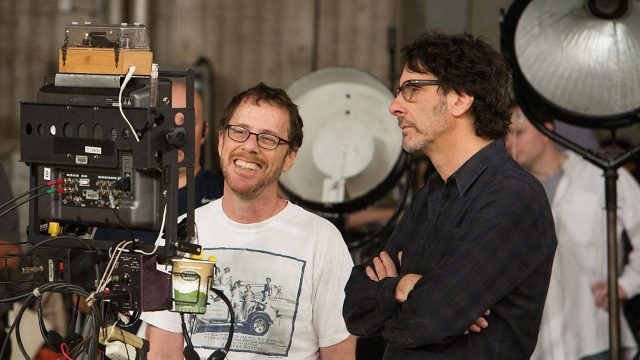I asked a bunch of my friends if doing Ethan and Joel Coen in a single article was cheating. After all, they are, technically, two different people. On the other hand, they’ve done everything together and in fact are thought of by some as “the two-headed director.” While their early films credit Joel as director and Ethan as producer, they both shared both jobs. And I had to look that up—they’re so connected in my brain that I was reading a detail from one’s IMDb page to Graham and had to double check which page I was reading. Because I had already forgotten. While reading. I made the decision to do a single article, and it turns out Wikipedia vindicates me; they have a single Wikipedia page.
Joel is older by about three years. They were born and raised in Minneapolis. St. Louis Park, actually, the same as Al Franken, who says it’s the Jewish part of Minneapolis, inasmuch as there’s any Jewish part of Minneapolis. They had a fairly basic upbringing that they don’t talk about much and were making films by the late ’60s, starting with one filmed in the Minneapolis airport called “Henry Kissinger, Man on the Go,” which I would kill to see. Joel had mowed lawns to earn the money to buy their camera, adding to my theory that the great filmmakers of a certain era took advantage of the mass availability of filming equipment as children.
The fact is, they have always worked together, ever since those days. It’s hard to picture one working without the other. The polite fiction that (looks it up again) Ethan produced and Joel directed had to do with rules about how things were credited, and as soon as they could get around it, they did. The Directors Guild claims that having multiple directors dilutes the position’s significance, whatever that means, and only allows it in the case of “established duos.” As of The Ladykillers, the Coens are apparently established enough for the guild. I assume but cannot prove that something similar is going on to have led to the creation of “Roderick Jaynes,” their editor. I’m also curious as to how Jaynes would accept an Oscar; he has been nominated for two but not yet won.
I am of the school that holds that the Coens do not in general have disdain for their characters. There are exceptions, but those exceptions have usually earned their creators’ disdain. They are not patronizing Marge Gunderson or Larry Gopnik, and if they’re patronizing Ulysses Everett McGill, well, he’s earned it. And they still have compassion for him in the moments where he’s earned their compassion instead. I do think that Everett falls prey to the greatest sin in the Coens’ theology—he refuses to grow up and take responsibility—but once he’s bona fide, he atones.
I could write quite a lot about sin and atonement in Coen movies. They freely admit to being influenced by their Jewish heritage, not just in movies like A Serious Man where Hashem is almost a character at times. But another sin in the Coens’ filmography is willful ignorance, to be atoned for through education, and that’s also got its roots in Jewish theology. It is, after all, a religion of a book, one that has for millennia put a strong value on scholarship. Perhaps the reason people consider the Coens to be looking down on their characters is the importance of responsibility and education and the characters who are lacking in one or the other.
The Coens are more filmmakers who have preferred people to work with, and not just Roderick Jaynes. It’s unsurprising that they routinely cast Frances McDormand. (Looks it up.) Joel has been married to her for decades. Since before Blood Simple was released, in fact. But neither one is married to Steve Buscemi or John Turturro. Or George Clooney! They also regularly work with Roger Deakins, have almost all their films scored by Carter Burwell, even have all the sound editing done by Skip Lievsay. They know how they like their films to go, and they hire people who they know can do it.
In fact, they discourage improvisation on the set, suggesting that actors try the lines as written. Coen Brothers movies are done the Coen way. Clearly, it’s a way that works for all of us.


